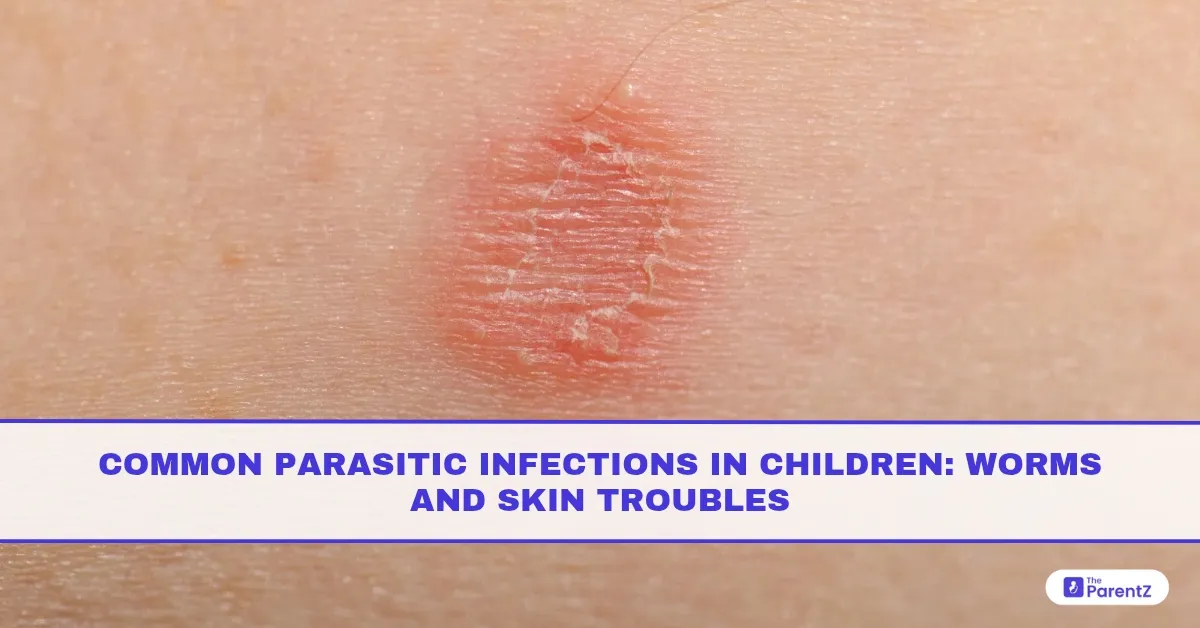It’s a moment every parent dreads seeing your child scratch persistently, complain of a tummy ache, or discover unusual spots on their skin. Often, these symptoms are harmless. But sometimes, they point to a parasitic infection, a common but manageable part of childhood, especially in tropical or low-hygiene settings.
Parasitic infections in children range from intestinal worms that cause discomfort and poor appetite to skin parasites that itch and spread. The good news? Most are easily treatable and preventable with simple hygiene and timely care.
1. Intestinal Worms (Helminths)
a. Roundworms (Ascaris lumbricoides)
These long, spaghetti-like worms live in the intestines and are one of the most common parasites in Indian children.
How children get it:
From contaminated soil, food, or water—especially where handwashing is poor.
Symptoms:
- Poor appetite or weight loss
- Abdominal pain
- Visible worms in stool or vomit
- Cough (in severe cases, as larvae migrate through lungs)
Treatment:
A single dose of albendazole or mebendazole prescribed by a doctor is usually effective.
b. Pinworms (Enterobius vermicularis)
These tiny, white, thread-like worms are especially common in school-going children.
How children get it:
By touching contaminated surfaces or bedding and then putting their fingers in their mouths.
Symptoms:
- Severe itching around the anus, especially at night
- Trouble sleeping or irritability
- Scratching may cause skin irritation
Treatment:
A two-dose course of albendazole or mebendazole, with a repeat dose in 2 weeks. Treat the whole family to prevent reinfection.
c. Hookworms (Ancylostoma, Necator)
Hookworm larvae can penetrate the skin, often through bare feet.
How children get it:
Walking barefoot on contaminated soil.
Symptoms:
- Tiredness or weakness (due to blood loss)
- Pale skin (anemia)
- Abdominal discomfort
Treatment:
Deworming medications (e.g., albendazole) plus iron supplements if anemia is present.
2. Protozoal Infections
a. Giardiasis (Giardia lamblia)
A microscopic parasite that lives in the intestine and is spread through contaminated water or food.
Symptoms:
- Watery, foul-smelling diarrhoea
- Bloating and gas
- Fatigue
- Poor weight gain
Treatment:
Usually treated with metronidazole or tinidazole.
b. Amoebiasis (Entamoeba histolytica)
More common in older children and adults, but still seen in some toddlers.
Symptoms:
- Abdominal pain and cramps
- Mucus or blood in stool
- Occasional fever
Treatment:
Prescribed antibiotics like metronidazole, followed by a luminal agent to eliminate cysts.
3. Skin Parasitic Infections
a. Scabies (Sarcoptes scabiei)
Caused by tiny mites that burrow under the skin, scabies is extremely itchy and contagious.
Symptoms:
- Intense itching, especially at night
- Small red bumps or blisters
- Rash often appears in the webs of fingers, wrists, waistline, or groin
Treatment:
Topical cream like permethrin 5% applied head-to-toe and left overnight. Repeat after one week. Bedding and clothes must be washed in hot water.
b. Lice (Pediculosis capitis)
These parasites live on the scalp and feed on blood. Common in school-aged children.
Symptoms:
- Intense scalp itching
- Visible lice or nits (tiny white eggs) near the scalp
- Irritability or trouble sleeping
Treatment:
- Medicated shampoo (like permethrin or malathion)
- Manual removal with a fine-toothed comb
- Treat all close contacts and wash bedding
When to See a Doctor
Call your healthcare provider if your child has:
- Unexplained itching that lasts more than a few days
- Visible worms or blood in the stool
- Poor appetite, weight loss, or fatigue
- Skin rashes or sores that worsen
- Recurrent tummy pain or loose stools
How to Prevent Parasitic Infections
While parasites are common, many infections can be prevented with a few practical steps:
Hygiene:
- Encourage regular handwashing with soap, especially after using the toilet and before eating.
- Trim nails short to prevent eggs from hiding under them.
Safe Food & Water:
- Use clean, filtered, or boiled drinking water.
- Wash fruits and vegetables well.
- Avoid street food or unwashed produce.
Personal Care:
- Avoid walking barefoot in unknown or dirty areas.
- Regularly change and wash underclothes.
- Teach children not to share combs, hats, or bedding.
Deworming:
In India, national guidelines recommend deworming every 6 months for children aged 1–19 years in high-risk areas. Always follow your pediatrician’s advice on timing and dosage.
Conclusion: Stay Alert, Not Alarmed
Parasitic infections can sound frightening, but with early detection and proper care, most resolve quickly and completely. Understanding the symptoms whether it’s tummy troubles, itching, or weight loss can help you act early and keep your child feeling their best.
And remember, you’re not alone. These are common childhood illnesses, and your doctor is there to help guide you through it with compassion and clarity.






Be the first one to comment on this story.